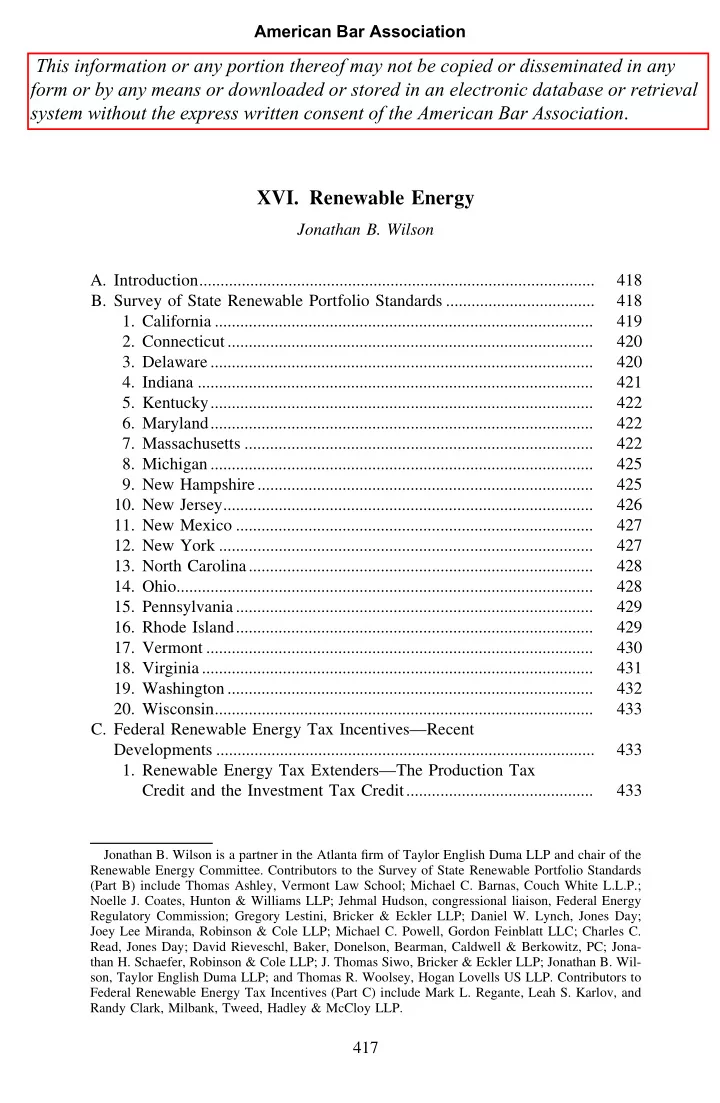

American Bar Association This information or any portion thereof may not be copied or disseminated in any form or by any means or downloaded or stored in an electronic database or retrieval system without the express written consent of the American Bar Association . XVI. Renewable Energy Jonathan B. Wilson A. Introduction............................................................................................. 418 B. Survey of State Renewable Portfolio Standards ................................... 418 1. California ......................................................................................... 419 2. Connecticut ...................................................................................... 420 3. Delaware .......................................................................................... 420 4. Indiana ............................................................................................. 421 5. Kentucky.......................................................................................... 422 6. Maryland.......................................................................................... 422 7. Massachusetts .................................................................................. 422 8. Michigan .......................................................................................... 425 9. New Hampshire............................................................................... 425 10. New Jersey....................................................................................... 426 11. New Mexico .................................................................................... 427 12. New York ........................................................................................ 427 13. North Carolina................................................................................. 428 14. Ohio.................................................................................................. 428 15. Pennsylvania .................................................................................... 429 16. Rhode Island.................................................................................... 429 17. Vermont ........................................................................................... 430 18. Virginia ............................................................................................ 431 19. Washington ...................................................................................... 432 20. Wisconsin......................................................................................... 433 C. Federal Renewable Energy Tax Incentives—Recent Developments ......................................................................................... 433 1. Renewable Energy Tax Extenders—The Production Tax Credit and the Investment Tax Credit............................................ 433 Jonathan B. Wilson is a partner in the Atlanta firm of Taylor English Duma LLP and chair of the Renewable Energy Committee. Contributors to the Survey of State Renewable Portfolio Standards (Part B) include Thomas Ashley, Vermont Law School; Michael C. Barnas, Couch White L.L.P.; Noelle J. Coates, Hunton & Williams LLP; Jehmal Hudson, congressional liaison, Federal Energy Regulatory Commission; Gregory Lestini, Bricker & Eckler LLP; Daniel W. Lynch, Jones Day; Joey Lee Miranda, Robinson & Cole LLP; Michael C. Powell, Gordon Feinblatt LLC; Charles C. Read, Jones Day; David Rieveschl, Baker, Donelson, Bearman, Caldwell & Berkowitz, PC; Jona- than H. Schaefer, Robinson & Cole LLP; J. Thomas Siwo, Bricker & Eckler LLP; Jonathan B. Wil- son, Taylor English Duma LLP; and Thomas R. Woolsey, Hogan Lovells US LLP. Contributors to Federal Renewable Energy Tax Incentives (Part C) include Mark L. Regante, Leah S. Karlov, and Randy Clark, Milbank, Tweed, Hadley & McCloy LLP. 417
American Bar Association 418 RECENT DEVELOPMENTS—2013 2. Business Tax Extenders—Depreciation.......................................... 434 3. Sequestration.................................................................................... 435 4. The 1603 Cash Grant ...................................................................... 436 5. Remaining Issues............................................................................. 437 A. I NTRODUCTION The past year was a difficult one for producers of renewable energy in the United States. Several key tax incentives for renewable energy production began to sunset and the political prospects for extending those programs appear unlikely. In 2012, for the first time since 2007, the total production of renewable energy in the United States declined year-over-year, as hydropower in the Pa- cific Northwest fell dramatically from an above-normal level of production in 2011. 1 At the same time, U.S. ethanol production in 2012 amounted to only 13.3 billion gallons, its lowest level since 2009, reflecting drought conditions in the U.S. Midwest and cutbacks and sunsetting of federal liquid fuels tax credits. 2 This report updates the Committee’s previously published fifty-state survey of state renewable portfolio standards and its previous reporting on federal tax credit programs. B. S URVEY OF S TATE R ENEWABLE P ORTFOLIO S TANDARDS This Committee’s 2011 report contained a survey of the implementation of renewable portfolio standards (RPS) in the fifty states. 3 RPS are a tool used by policymakers to require utilities to generate at least a portion of their total power capacity through one or more types of renewable power generation. This report contains an update of that effort, taking into account developments between January 31, 2012, and January 1, 2013. The appendix on page 438 summarizes RPS requirements by state with more detail available in this section of the report for those states that have changed requirements during the reporting period. Each state’s RPS is described as of January 1, 2013. 1. Short Term Energy Outlook , U.S. E NERGY I NFO . A DMIN . (Mar. 19, 2013), http://www.eia.gov/ forecasts/steo/report/renew_co2.cfm. 2. Id . 3. The Database of State Incentives for Renewables & Efficiency (DSIRE) is an ongoing project of the North Carolina Solar Center and the Interstate Renewable Energy Council. It is funded by the U.S. Department of Energy’s Office of Energy Efficiency and Renewable Energy, primarily through the Office of Planning, Budget and Analysis. The site is administered by the National Renewable Energy Laboratory, which is operated for the Department of Energy by the Alliance for Sustainable Energy, LLC. See generally http://www.dsireusa.org/about/. Although much of the information in this report can be found on the DSIRE website, it is intended to provide a resource with greater legal source citations that was available through the DSIRE website as well as to create a baseline for future reports to the Section.
Recommend
More recommend